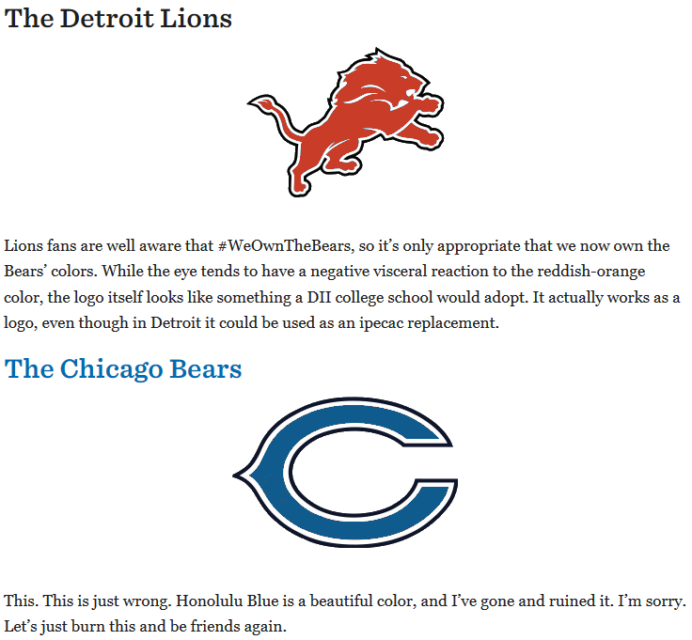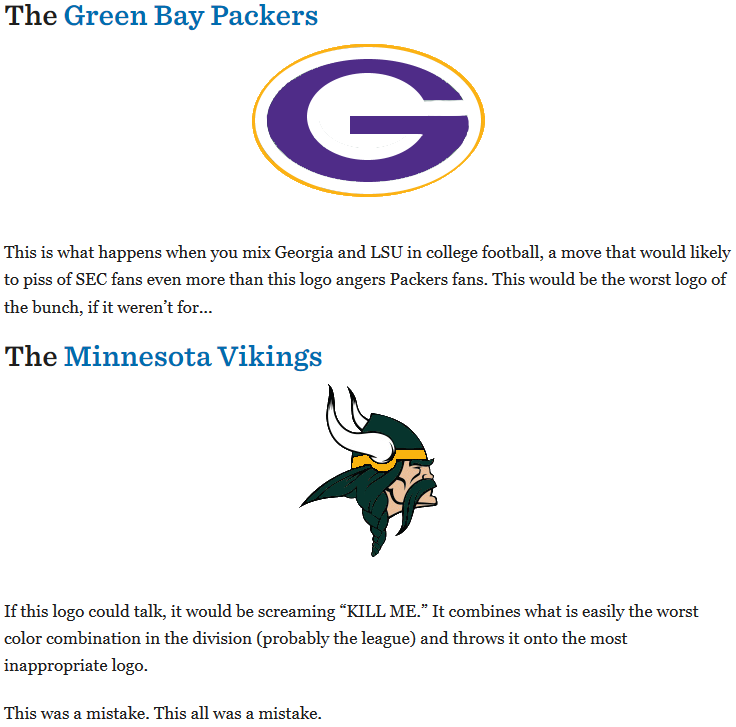Published on 11 May 2017
Italy, France, Serbia, Britain and Russia joined forces at the Macedonian Front and the “five nation army” wants to break through the lines held by Bulgaria with some German support. But the Bulgarian defences can withstand the attack and so Maurice Sarrail is forced to abandon all hopes for a breakthrough. Meanwhile another offensive is about to proceed at the Italian front which had been quiet all winter.
May 12, 2017
The Macedonian Standoff – The Five Nation Army Is Repelled I THE GREAT WAR Week 146
Pride of Detroit! Delete your account now!
 The Detroit Lions fan site Pride of Detroit wondered if it was possible to enrage the fans of all four NFC North teams with one simple post. They had to come up with something instantly offensive, but uniform … there we go: change the uniform colours … naw, too much work. How about just change the logo colours? That’d rile up the rubes in no time! They more than accomplished their nefarious end:
The Detroit Lions fan site Pride of Detroit wondered if it was possible to enrage the fans of all four NFC North teams with one simple post. They had to come up with something instantly offensive, but uniform … there we go: change the uniform colours … naw, too much work. How about just change the logo colours? That’d rile up the rubes in no time! They more than accomplished their nefarious end:


“Maybe this is creeping privatization after all. It’s certainly worth a shot”
Chris Selley on the neither one thing nor the other state of alcohol retailing in Ontario:
On Tuesday the government enumerated 76 new Ontario supermarkets where, by Canada Day, you will be able to buy beer. That will make a total of 206 Ontario supermarkets where you can buy beer — an artificially limited selection of beer, only in six packs and singles and only during the same bankers’ hours as the LCBO and Beer Store. But still. That’s about one-third as many supermarkets selling beer as there are LCBO outlets selling beer; add in the 212 rural agency stores that sell wine, liquor and beer, and you’ve got almost two-thirds as many private enterprises selling beer as you have government bottle shops.
This could help prove several useful concepts that deserve much wider acceptance in Ontario. One is that it’s very easy for the government to make money off liquor sales without retailing liquor itself. Indeed, it’s easier; that’s why so many governments do it. The supermarkets buy the beer wholesale from the LCBO; the LCBO doesn’t have to worry about paying civil servants to sell that beer or running the stores.
Another is that the private sector can be counted on to keep liquor out of children’s hands. Indeed, with inspections and draconian fines in place, it can probably be trusted more. My observations suggest LCBO employees certainly card everyone who should be carded, but it’s nothing like it is in the U.S. I’m almost 41, not in especially good nick, and I still get asked about half the time.
Might Ontarians develop a taste for all this convenience? The hard cap on beer-in-supermarket licences is 450; having doled them all out, including agency stores, that would mean about half the liquor outlets in Ontario were privately run. And people might start to notice the bizarre inconsistencies: why can the Walmart on Bayfield Street in Barrie sell only beer, and only in six packs, while the Walmart on Hays Boulevard in Oakville can sell beer and wine, and meanwhile Hope’s Foodland in Novar, Mac’s Milk in Craigleith, Redden’s campground in Longbow Lake and Lac des Mille Lacs Bait and Tackle in Upsala can sell beer, wine and hard liquor — and smokes and fireworks and beef jerky and bread and eggs? Why can scores of convenience stores sell everything alcoholic as agency stores, but other convenience stores aren’t even eligible to apply for the new wine and beer licences?
Jeremy Clarkson talks speed camera politics – Top Gear – Series 1 – BBC
Uploaded on 12 Apr 2007
The Top Gear boys, Jeremy Clarkson, Richard Hammond and James May discuss the politics of speed cameras…
QotD: Don’t talk to the police without legal counsel
“Don’t talk to law enforcement without consulting a lawyer” is simple advice. Anyone can follow it. Most of us understand why it’s a good idea. But too many people reject the advice because of a common and misplaced fear. It’s the fear that if they don’t return that detective’s call immediately, if they don’t invite the FBI agents at their door in and answer their questions, if they don’t cooperate, they will be seen as the sort of person who wants a lawyer. They will be seen as someone suspicious. They will lose the opportunity to “clear all this up” by “cooperating.”
If I say I want to talk to a lawyer, won’t I make things worse?
No. Almost certainly not.
When you view any interaction as your only opportunity to “cooperate,” you’re accepting a false premise, a law enforcement pressure tactic calculated to get you to act against your best interests and better judgment. On television, cops constantly tell suspects “you have to talk now, talk first, or we’ll give a deal to your buddy.” On television, that proposition is presented as true. But real life isn’t like television. In real life, that “now or never” proposition is almost always false. In 21 years practicing criminal law, I have never seen a circumstance where stopping the interview and talking to a lawyer would have destroyed someone’s opportunity to talk to law enforcement and resulted in harm to their best interests. There’s always been another chance, once the client has talked to a lawyer and taken advantage of competent advice about the situation.
The police want you to talk immediately, now, when they are unexpectedly at your front door. They want you to be startled, nervous, out-of-sorts. They want you to blurt things out — either admit true things that they can use against you, or make false statements that they can disprove and use to show you’re a liar. They don’t want you to have time to collect your thoughts, to refresh your memory about the events they are asking about, to look at any relevant documents or evidence, or to figure out the legal significance of the situation. The police know that’s against your best interests. They know that you should talk to a lawyer first. How do you know that they know that? You know because police officers consistently push for state laws and union rules allowing them to talk to a lawyer, review evidence, and take advantage of a waiting period before being interviewed about use-of-force incidents.
Good people — honest people — tend to think “I’ve done nothing wrong, so if I tell the truth now, I can clear this up.” They think “talking can’t hurt me because I haven’t done anything wrong, and because I won’t lie.” It would be wonderful if that were true, but it’s not.
Ken White, “‘If I Just Talk To The Police I Can Clear This Up’ — The Dangerous Delusion”, Brown, White & Osborn, 2015-09-24.



